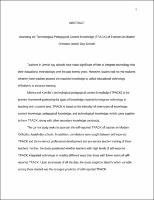Please use this identifier to cite or link to this item:
https://hdl.handle.net/20.500.12202/8010| Title: | Assessing the Technological Pedagogical Content Knowledge (TPACK) of Teachers in Modern Orthodox Jewish Day Schools |
| Authors: | Turetsky, Ilana Levy, Hal |
| Keywords: | Pedgagogy Educational technology |
| Issue Date: | Jan-2019 |
| Publisher: | ProQuest Dissertations & Theses Global |
| Citation: | Levy, H. (2019, January). Assessing the Technological Pedagogical Content Knowledge (TPACK) of Teachers in Modern Orthodox Jewish Day Schools (Publication / Order No. 27773287) [Doctoral Dissertation, Yeshiva University]. (2359294901) |
| Series/Report no.: | ProQuest Dissertations & Theses Global;2359294901 |
| Abstract: | Teachers in Jewish day schools have made significant efforts to integrate technology into their educational methodology over the past twenty years. However, studies had not yet explored whether these teachers possess the requisite knowledge to utilize educational technology effectively to enhance learning. ¶ Mishra and Koehler's technological pedagogical content knowledge (TPACK) is the premier framework portraying the types of knowledge required to integrate technology in teaching one's content area. TPACK is based on the interplay of three types of knowledge: content knowledge, pedagogical knowledge, and technological knowledge, which come together to form TPACK, along with other secondary knowledge constructs. ¶ The current study seeks to ascertain the self-reported TPACK of teachers in Modem Orthodox Jewish day schools. In addition, correlations were sought between self-reported TPACK and the in-service professional development and pre-service teacher training of these teachers. Further, the study questioned whether teachers with high levels of self-reported TPACK integrated technology in notably different ways than those with lower levels of selfreported TPACK. Upon an analysis of all the data, the study sought to identify which variable among those studied was the strongest predictor of self-reported TPACK. ¶ In analyzing the responses of 109 teachers, the results found self-reported TPACK levels to be high, with no significant discrepancies among any of the demographic variables. Correlations were found between self-reported TPACK and in-service professional development and pre-service teacher training. Teachers who report high levels of TPACK also claim to use technology in notably different ways than those who report lower levels of TPACK. Within the TPACK framework, technological pedagogical knowledge was the strongest predictor of TPACK, followed by technological content knowledge. From all the variables surveyed outside of the TPACK framework, nature of technology integration was the strongest predictor of selfreported TPACK, followed by hours of in-service professional development. ¶ The current study aims to assist Jewish day schools by clarifying what types of knowledge teachers in Modern Orthodox Jewish day schools possess in regards to technology integration. Due to the wide scope of the study, future research is required to delve deeper into these findings. In addition, given the multitude of factors that play a role in technology integration, future research studying factors such as pedagogical beliefs, accessibility of technology, and school culture, is required to attain the complete picture regarding technology integration in Modern Orthodox Jewish day schools. |
| Description: | Doctoral dissertation, EdD / Open Access |
| URI: | https://ezproxy.yu.edu/login?url=https://www.proquest.com/dissertations-theses/assessing-technological-pedagogical-content/docview/2359294901/se-2?accountid=15178 https://hdl.handle.net/20.500.12202/8010 |
| ISBN: | 9781392548998 |
| Appears in Collections: | Azrieli Graduate School of Jewish Education & Administration: Doctoral Dissertations |
Files in This Item:
| File | Description | Size | Format | |
|---|---|---|---|---|
| hal levy - tpack in mo jewish day schools - dissertation - final1 Jan2019 7April2022 retro OR.pdf | 1.39 MB | Adobe PDF |  View/Open |
This item is licensed under a Creative Commons License

